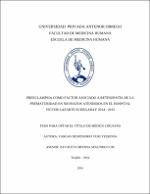Preeclampsia como factor asociado a retinopatía de la prematuridad en neonatos atendidos en el hospital Víctor Lazarte Echegaray 2014 - 2015

View/
Download
(application/pdf: 509.5Kb)
(application/pdf: 509.5Kb)
Date
2016Author(s)
Vargas Desposorio, Yuri Yessenia
Metadata
Show full item recordAbstract
Determinar si la preeclampsia es un factor asociado a retinopatía de la prematuridad
(ROP) en neonatos atendidos en el Hospital Víctor Lazarte Echegaray 2014 – 2015.
Material y métodos: Se realizó un estudio observacional, analítico y retrospectivo en 120
recién nacidos prematuros atendidos en el Hospital Víctor Lazarte Echegaray en el período
2014 – 2015, divididos en dos grupos según criterios de selección, aquellos con diagnóstico de
retinopatía de la prematuridad y aquellos sin dicho diagnóstico. Para el análisis estadístico se
utilizó la prueba de Chi Cuadrado y se consideró asociación estadística significativa a un valor
de p <0,05. El Odss Ratio constituyó el estadígrafo utilizado en el estudio.
Resultados: La incidencia de ROP en recién nacidos prematuros fue de 16%, el peso
promedio al nacer en pacientes con ROP fue de 1389.63 gramos, y la media de edad
gestacional fue de 30.3 semanas. No se encontró asociación significativa entre preeclampsia y
retinopatía de la prematuridad, se obtuvo un OR de 1, 65 con IC 95% [078 – 3,48] con un
valor de p no significativo (p=0,187). El estadío I de severidad de ROP fue el más frecuente
con un 73.4%, mientras que ningún paciente desarrollo estadíos IV o V.
Conclusiones: La preeclampsia no es un factor asociado a retinopatía de la prematuridad, ya
que no se encontró asociación estadísticamente significativa entre ambas variables en el presente estudio. To determine if preeclampsia is an associated factor to retinopathy of prematurity
(ROP) in infants that were attended at Víctor Lazarte Echegaray Hospital 2014-2015.
Material and methods: We performed an observational, analytical and retrospective design
in 120 preterm newborns treated at the Víctor Lazarte Echegaray Hospital during the 2014 -
2015 period, preterm infants were divided in two groups according to the selection criteria,
those with and without diagnosis of retinopathy of prematurity. For statistical analysis we used
the chi square test and was considered a statistical association p value < 0,05. The odds ratio
was the study statistician used in this study.
Results: The incidence of ROP in preterm infants was 16%. Mean birth weight was 1389.63
grams, and the mean gestational age was 30.3 weeks. There was no significant association
between preeclampsia and ROP, the Odds Ratio was 1, 65 with IC 95% [078 – 3,48] and the p
value didn’t have statistical significance (p=0,187). The stage I of ROP severity was the most
common with a 73.4%, and any patient developed stage IV o V of ROP severity.
Conclusions: Preeclampsia is not an associate factor to retinopathy of prematurity,
considering that there was no statistically significant association between the two conditions,in this study.
Collections
- Medicina Humana [2969]

